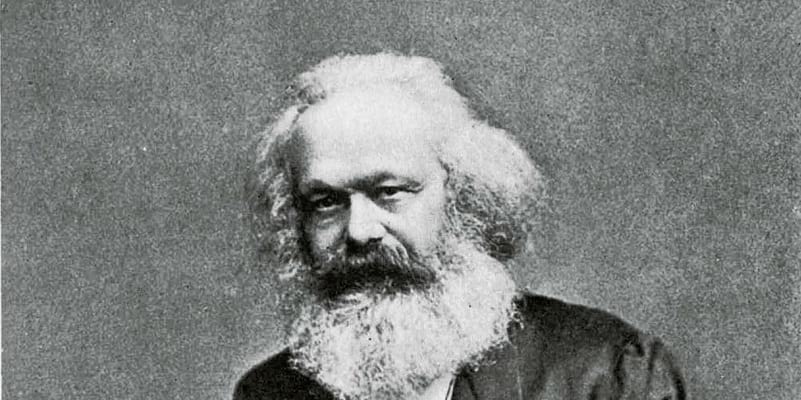Karl Marx biography and books

Karl Marx (5 May 1818 – 14 March 1883) was a world-known journalist, philosopher, and economist. Together with Friedrich Engels, Karl Marx authored ‘Manifesto of the Communist Party’ and enlarged the pamphlet in his book ‘Das Kapital’. This formed the basis of Marxism.
The biography of Karl Marx
Marx was born in 1818 in Trier, Germany. He grew up in a Jewish family consisting of 11 family members but they did not grow up religiously. His father devoted himself to Protestantism and baptized him in a protestant church because of laws which in that time banned Jews from living in higher society.
Both his parents educated Karl Marx at home for approximately 12 years. After this period, he enrolled at Jesuit high school in Trier. Although Karl Marx is today known for his work, he spent his childhood rebellious.
When he was 17, Karl Marx attempted to study law at the University of Bonn in Germany but did not manage to finalize his study. His debts were increasing, he was arrested for being publicly drunk, and he was involved in a violent incident. As a result, his father decided to transfer his son to the University of Berlin where he studied philosophy.
In this period, Karl Marx became more radical. He was associated with groups that were involved in political- and religion criticism. At the same, he became engaged to Jenny von Westphalen, an affluent German woman.
After he obtained his degree in philosophy, Karl Marx began to work as a journalist for the Rheinische Zeitung, a German liberal newspaper. He later became the newspaper’s editor, but due to the radical perspective of the newspaper, the German government quickly decide to ban the newspaper from publishing from 1843.
Karl Marx married his fiancé Jenny von Westphalen, and together, they moved to Paris. In Paris, he created along with Arnold Ruge the Deutsch-Französische Jahrbüche, a journal wherein various essays and other articles were published. Another writer of the journal was Friedrich Engels which later became his partner and friend.
However, on request of the German government, Karl Marx was also banned from Paris. He was forced to leave France and moved together with Friedrich Engels to Brussel in Belgium. In this time, Brussel was the heart for people who were banned from other countries because Brussel welcomed citizens from around the globe. Both Marx as Friedrich could, for this reason, meet other people such as Moses Hess who introduced socialism to both.
In 1846, Karl Marx founded a Communist Correspondence Committee with the goal to link European socialists. His ideas about socialism created interests at socialists in England, and he was consequently requested to author ‘Manifest der Kommunistischen Partei,’ Manifesto of the Communist Party. His work was published in 1848, but within one year, Karl Marx was also banned from Belgium. After visiting Paris and Germany, he rehoused to London.
In this period, Karl Marx helped develop the German Worker’s Educational Society and as well as helping find a location for the Communist League, an international political party that is regarded as the first Marxist political party.
Karl Marx now focused more on developing his capitalism– and economic theories. He also helped to build the International Workingmen’s Association, an organization that attempted to unite left-wing socialists, communist, anarchist groups, and trade union that was based on the working class and class struggle.
As a consequence, in 1867, Karl Marx published the first volume of ‘Das Kapital’. In his book, he criticized the political economy and designed a new economic theory which laid the foundation for communism. He spent the rest of his life on improving and developing his work. He did however not finish his work because he died by pleurisy, an inflammation of the membranes that surround the lungs and line the chest cavity.
Karl Marx’s work is considered as highly influential. The Manifesto of the Communist Party is regarded as one of the most influential political manuscripts ever. His book ‘Das Kapital’ receives the same recognition.
His work led to various economic concepts such as the labor theory of value, and capital accumulation. Karl Marx’s work could be scientifically tested, and with his focus on individuals and their relationship within society, he is considered as the founder of modern sociology.
Famous quotes
- “History repeats itself, first as tragedy, second as farce.”
- “The production of too many useful things results in too many useless people.”
- “The history of all previous societies has been the history of class struggles.”
- “Democracy is the road to socialism.”
- “Workers of the world unite; you have nothing to lose but your chains.”
- “Nothing can have value without being an object of utility.”
- “Revolutions are the locomotives of history.”
- “The ruling ideas of each age have ever been the ideas of its ruling class.”
- “Art is always and everywhere the secret confession, and at the same time the immortal movement of its time.”
- “The country that is more developed industrially only shows, to the less developed, the image of its own future.
Publications and Books by Karl Marx et al.
- 2018. Capital volume 1</em (Vol. 1). Lulu. com.
- 2016. Tesis sobre Feuerbach. Karl Marx.
- 2014. El capital II (Vol. 2). J. Borja.
- 2013. Manifesto of the communist party. Simon and Schuster.
- 2011. Capital, Volume I: A critique of political economy (Vol. 1). Courier Corporation.
- 2010. A contribution to the critique of political economy. In Marx Today (pp. 91-94). Palgrave Macmillan, New York.
- 2009. The economic and philosophic manuscripts of 1844 and the Communist manifesto. Prometheus Books.
- 2009. Karl Marx & Friedrich Engels. Collector’s Library.
- 2008. The 18th Brumaire of Louis Bonaparte. Wildside Press LLC.
- 2008. Critique of the Gotha program. Wildside Press LLC.
- 2005. Grundrisse: Foundations of the critique of political economy. Penguin UK.
- 2002. The communist manifesto. Penguin.
- 2002. Max Weber and Karl Marx. Routledge.
- 2002. Capital: In 2 vol. Dent.
- 2000. Karl Marx: selected writings. Oxford University Press, USA.
- 1999. Theories of Surplus Value: Books I, II, and III. Prometheus Books/Humanity Books.
- 1999. Marx on suicide. Northwestern University Press.
- 1997. Writings of the young Marx on philosophy and society. Hackett Publishing.
- 1996. Marx: Later political writings. Cambridge University Press.
- 1996. Manuscrits de 1844. GF-Flammarion.
- 1994. Marx: Selected Writings. Hackett Publishing.
- 1994. Marx: Early Political Writings. Cambridge University Press.
- 1993. Capital: volume III (Vol. 3). ePenguin.
- 1989. Collected works (Vol. 31). International Publishing Company Incorporated.
- 1988. Marx and the French Revolution. University of Chicago Press.
- 1986. Karl Marx: a reader. Cambridge University Press.
- 1980. Marx & Engels Collected Works Vol 16: Marx and Engels: 1858-1860. Lawrence & Wishart.
- 1978. The eighteenth brumaire of Louis Bonaparte (Vol. 11, pp. 99-197). Peking: Foreign Languages Press.
- 1977. Critique of Hegel’s’ Philosophy of right’. CUP Archive.
- 1976. Results of the immediate process of production. published as an appendix to Capital, 1.
- 1976. Capital: a critique of political economy, 3 vols.
- 1975. The holy family. Рипол Классик.
- 1975. On the Jewish question.
- 1975. Marx & Engels Collected Works Vol 01: Marx: 1835-1843. Lawrence & Wishart.
- 1973. Karl Marx on society and social change: With selections by Friedrich Engels. University of Chicago Press.
- 1972. The marx-engels reader (Vol. 4). New York: Norton.
- 1971. Frühe Schriften.
- 1970. The German Ideology, ed. CJ Arthur. New York: International.
- 1970. The german ideology (Vol. 1). International Publishers Co.
- 1969. Basic writings on politics and philosophy.
- 1968. Karl Marx on colonialism and modernization: his despatches and other writings on China, India, Mexico, the Middle East and North Africa. Doubleday.
- 1967. Capital: A critique of political economy volume I: The process of capitalist production (p. 72). International Publishers.
- 1965. Wages, price and profit. Peking: Foreign Languages Press.
- 1965. The german ideology. London, England.
- 1964. Pre-capitalist economic formations. New York.
- 1954. Theories of surplus value.
- 1951. Das kapital (Vol. 1). Рипол Классик.
- 1942. Wage-labour and capital (pp. 208-209). International Bookshop.
- 1911. Critique of political economy. CH Kerr@ Company.
- 1910. Value, price, and profit. CH Kerr & Company.
- 1902. Wage-labor and capital. New York Labor News Company.
- 1900. The civil war in France. International library Publishing Company.
- 1875. Le capital (Vol. 1). Lachâtre.
- 1859. Preface to a Contribution to the Critique of Political Economy. The Marx-Engels Reader,2 ,3-6.
- 1852. The Eighteenth Brumaire of Louis Bonaparte by Karl Marx. Die Revolution
- 1844. Estranged labour.
- 1844. Economic and philosophical manuscripts. Early writings, 333.
- 1844. Contribution to the Critique of Hegel’s Philosophy of Right. Deutsch-Französische Jahrbücher,7 (10).
- 1843. On the Jewish question.
How to cite this article:
Zeeman, A. (2018). Karl Marx. Retrieved [insert date] from Toolshero: https://www.toolshero.com/toolsheroes/karl-marx/
Published on: 03/15/2019 | Last update: 08/03/2023
Add a link to this page on your website:
<a href=”:https://www.toolshero.com/toolsheroes/karl-marx/”>Toolshero: Karl Marx</a>










